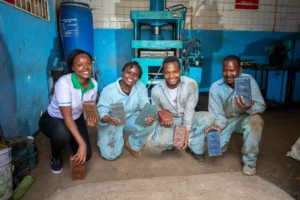
Challenge Fund for Youth Employment: sustainable, scalable solutions to youth unemployment
by VSO
83% of young people entering the labour market remain unemployed
Young people in Africa and the Middle East face major challenges. Unemployment or jobs with poor working conditions are some of them. Although 70% of the population of sub-Saharan Africa is under 30 years of age, the labour market is not sufficiently geared towards them. There is a discrepancy between education and training and labour market demand. Thus, 83 per cent of young people entering the labour market each year may remain unemployed, according to the Mo Ibrahim Foundation. Other complex problems negatively affecting young people’s future prospects are climate change, poverty and inequality. Young women and rural youth are disproportionately affected by these.
The Challenge Fund for Youth Employment
With the Challenge Fund for Youth Employment (2019-2025) we work on scalable solutions to youth unemployment. In doing so, we focus on digital & green jobs, both of which are seen as potential solutions to address the above-mentioned systemic problems, as there will be many jobs in these sectors in the future, and they can also address other problems.
Of particular note here is the role of young people themselves, who have been closely involved in the programme right from the programme design. These ‘Youth Champions’ are national VSO Volunteers in the countries themselves. They have an important voice in the CFYE Learning & Innovation agenda, which is building a strong evidence base around youth employment strategies. For example, they conducted research and were involved in approving proposals from local companies. This way of working proved a great success and was therefore further scaled up last year.
The Challenge Fund for Youth Employment (CFYE) is funded by the Dutch Ministry of Foreign Affairs and managed by a consortium of partners: VSO, Palladium and Randstad. We are currently working with 70 active implementing partners in 11 countries.
The social impact matrix
Another innovative tool within the programme is the social impact matrix: a self-assessment tool that enables implementing partners to focus their projects more on young people and women. It consists of three components: – attracting, selecting and retaining young talent – and specific building blocks, such as inclusive recruitment, development opportunities and peer networks.
In increasing our impact, we follow a three-step approach: we engage with partners to gain insights and conduct additional research (if necessary), we apply these insights, and we share them with the wider sector. For example, in 2022, together with Knowledge Platform Inclusive Development Policies INCLUDE, we conducted research on green jobs: how they relate to climate change, the sectors generating green jobs and the skills needed for them.
